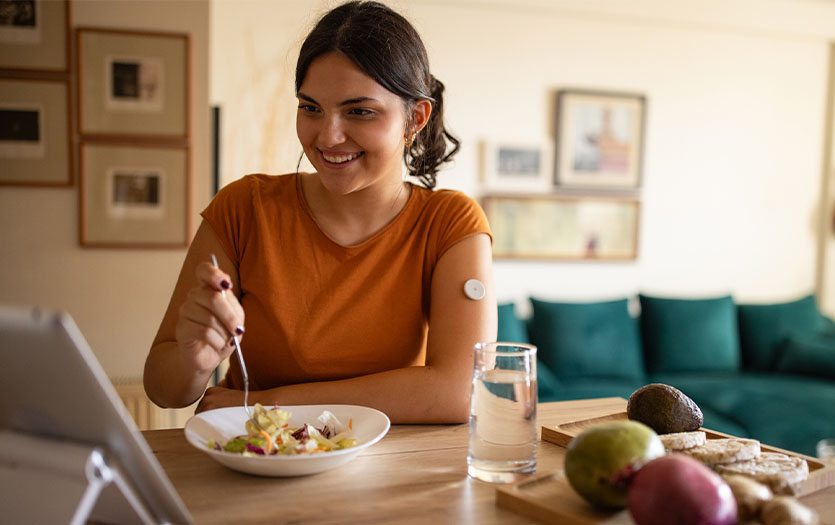
In 2021, the Centers for Disease Control and Prevention (CDC) reported that 29.7 million people in the United States were living with a diabetes diagnosis. As the number of adults with the chronic illness continues to increase, diabetes care specialists are teaming up with dietitians to provide patients with a holistic treatment plan. We asked Megan Bobay, dietitian, Parkview Huntington Hospital and Erika West, RN, certified diabetes care and education specialist, Parkview Huntington Hospital, to share more about their collaboration.
Can you tell us what specialties you bring to this care model?
Erika: We like to think of diabetes as a puzzle with many different fragments. As a diabetes care and education specialist, I focus on the pieces of basic diabetes understanding, medication and insulin education, blood sugar management and A1C goals.
Megan: I focus on the healthy eating portion. In tandem, we help patients with physical activity, reducing risks, mental health and problem-solving.
How do you work together to help serve your patients and create successful outcomes?
Erika: We both see adult patients one-on-one throughout the week. Some insurances don’t allow the covered individual to see a nurse and dietitian on the same day. If they do, we try to schedule their appointments back-to-back for the patient’s convenience. Our patients are all at different points along their journey. Some are newly diagnosed, and some have lived with diabetes for years. We strive to meet the patients where they are and work with them on creating realistic goals.
Megan: Often, our patients are juggling several other conditions with diabetes. They also face different barriers to reaching their goals, such as a lack of insurance coverage for medication and supplies, food insecurity, insufficient access to transportation or a lack of healthy coping skills. Our encouragement goes beyond advising patients to take their medication and eat healthily; we support them in putting all those puzzle pieces together.
What strategies do you use to educate and empower patients to manage their diabetes with dietary/medication adherence?
Erika: I am also a continuous glucose monitor (CGM) and insulin pump specialist. I think CGM technology has been a game-changer because it provides us with 24/7 blood sugar data. We have shared databases with our mutual patients’ reports, so we can review glucose patterns with them and brainstorm better methods of management. It also reinforces what is working well for our patients.
Megan: Even for those who do not utilize CGMs, we still monitor any glucometer readings and physician-ordered blood work. This allows us to coordinate care plans with their endocrinologist or primary care physician. By establishing trust with our patients, providing them with education and holding them accountable we are empowering patients to own and improve their overall health and quality of life.
Can you tell us about the positive results you've seen for patients since starting this collaborative approach?
Erika: We have seen positive outcomes with multiple patients by providing a dynamic approach to diabetes education paired with a personalized nutrition plan.
Megan: Patients express deep appreciation, and we genuinely enjoy celebrating with them when they meet and exceed their goals.
What are your thoughts on the rise in diabetes diagnoses?
Erika: I recently read an article published last year that predicted diabetes to more than double worldwide by 2050. This also correlates with a rise in obesity, another complex disease with multiple puzzle pieces. Advances in technology and medication are great tools to help patients manage their blood sugar but they can only do so much good. Patients must be able to access the information and support that dynamic care teams can provide them.
What are some of the other ways Parkview is shifting to support those with diabetes?
Megan: I look forward to being able to offer patients greater access to our services. Parkview Huntington is excited to be a rural site for VeggieRx starting this summer!
A diabetes diagnosis is one of the criteria to qualify for the produce prescription program al`~ong with receiving Medicaid, a lack of insurance or being food insecure. Participants are eligible to receive $50 in produce each month for 6 months and attend four nutrition education classes.
Erika: We recently opened an in-office virtual endocrinology clinic at the Huntington and Stultz Road office. This helps bridge the transportation and time barrier for our local patients who cannot easily make it to the Fort Wayne Location. Diabetes Care Services is also bringing easy access to patients with advancements in retinal scanning used to screen for diabetic retinopathy using portable AI technology. Diabetic retinopathy is the leading cause of blindness in adults, and screening is an important aspect of preventative care for those with diabetes.
Learn more
For additional questions or concerns about managing diabetes, call Parkview Diabetes Care Services at 260-373-4280 to speak with a diabetes educator, registered dietitian or lifestyle change specialist.



